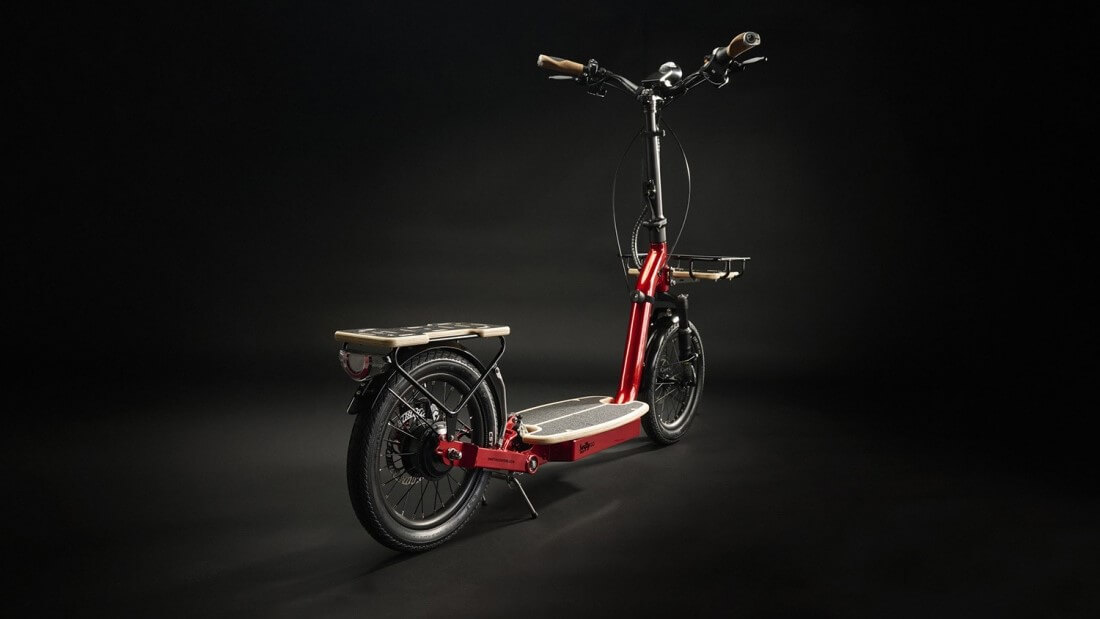
The answer to battery fires? Swifty’s new Go G500 e-scooter unveiled
260 days ago
5 minutes
Zag Daily speaks with Swifty’s co-founders about the launch of their new Swifty GO series and novel LFP battery design used in Teslas that is set to shake up the industry.
British scooter manufacturer Swifty Scooters unveiled a brand new Swifty GO G500 e-scooter, with an innovative Lithium FerroPhosphate (LFP) battery that resists thermal runaway, at Micromobility Industries summit in San Francisco on Oct 19-20.
Featuring Swifty’s signature 16-inch wheels, the mobility brand is adamant that this is the optimal choice and claims the experience of riding the Swifty Go is like no other due to its design choices.
Its disk brakes, dual suspension to smooth out uneven terrain, indicator lights, and large deck for better stability means it is optimised for rider safety, handling and control.
Co-founder Jason Iftakhar tells Zag Daily what inspired the Swifty brand name. “Swift birds fly close to the ground. They are acrobatic, fast and beautiful. That’s what we wanted to capture in the Swifty GO G500.
“The element of fun in the design is very important. That’s the essence of how we’ve built such a successful international brand. Riding is effortless. It’s fast and exhilarating like skiing or skateboarding, but anyone can do it, and nine times out of 10 they’ll come back with a smile.”

The fast-charging option gets to 80% in less than an hour and fully charges in three hours. A grip-twist throttle with comfort grips drive the 500W rear hub motor, reaching a top speed of 15.5 mph.
A safer battery chemistry
Perhaps the most unique safety feature is hidden at first sight. The 36V Lithium FerroPhosphate battery is tucked away underneath the wooden footplate. Different from Lithium-ion batteries, the LFP battery is known for its long life cycle, high charge efficiency, and that it resists thermal runaway which can lead to battery fires.
Developed in collaboration with British battery manufacturer PMBL, the LFP battery is a welcome addition to the e-scooter market.
Jason says: “LFP has never been used in an e-scooter before. It’s traditionally used in electric vehicles like Teslas or for battery storage in the grid.
“It’s not massively used because the energy density is less than a lithium-ion battery which takes up around half the space. We’ve been able to crack that by putting it all under the footplate.
“It’s going to shake up the market because unlike other batteries this will never catch fire. It is inherently safe. This is something that you can trust, something that you can charge in your home. You don’t have to worry about it.”
The battery’s durability and longer lifespan means Swifty’s environmentally conscious riders can feel good about their choice while getting more value from their investment. Importantly, the G500 uses components driven by international standards. The perishable components like tyres and brakes are easy to source so the customer can fix and repair their scooter long into the future.
Swifty’s supply chain also draws from more local British suppliers – the frames are made in Hertfordshire, the batteries in Devon and the scooters are assembled at its headquarters in Manchester.

When including the battery, the G500 weighs 24 kg and has a max load of 150 kg to accommodate the weight added with the optional pannier rack.
Camilla Iftakhar, Swifty’s other Co-Founder explains why including the panniers was a must for the design team: “It was crucial for us to address utility. If scooters are really going to replace short car journeys, they need to be able to carry some shopping. No one has ever addressed panniers on a scooter very well before, so we designed a pannier system which is massively expandable on the front and the back.”

Designed to complement cycling and walking
The G500 seeks to enable those who have barriers to cycling and walking.
In a recent survey, Swifty revealed that 20% of people would consider an e-scooter because they don’t cycle, while 28% said their journey is too far to walk.
“We’ve been manufacturing scooters for 10 years now and I’ve learnt that while many of our customers just love the feeling of scooting, a significant group of them have found that riding a scooter has completely unlocked their mobility. It’s just so easy to ride, and using a scooter really has a transformative effect on their well-being. The promise of unlocking freedom and independence really does come in one package.”
The e-scooter is setting a new standard in the industry. Despite the fact that private e-scooters are currently illegal on public UK roads, the co-founders are optimistic about the future.
“Safety gives people confidence,” says Jason. “By creating an e-scooter that inspires that confidence, we can spark effective change. I don’t believe in mandating change. I believe in inspiring change. That’s what we’re trying to achieve.”
The first 100 scooters will be delivered in April 2024. Prices for the Swifty GO G500 start from £2,499 and are delivered worldwide.

LEVA EU
Campaign success
Lorem ipsum dolor sit amet, consectetur adipisicing elit, sed do eiusmod tempor incididunt ut labore et dolore magna aliqua.
Member profile
Lorem ipsum dolor sit amet, consectetur adipisicing elit, sed do eiusmod tempor incididunt ut labore et dolore magna aliqua.